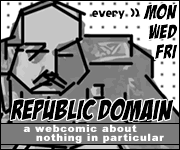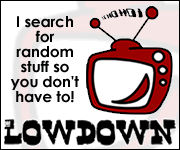Nuno Teixeira is a comic book artist, game designer, and web media specialist. His bio includes undergraduate work at art school, working at a company that transferred classic art to digital media, and finding himself in all sorts of trouble all over the internet. Check out his blog at NunoXEI.com
 What was the name of the place where you started doing digital transfers? You said it was a dream job for an artist, but did it ever get monotonous or cause you to feel creatively stifled? If not, what was it about the job that fulfilled your creativity?
What was the name of the place where you started doing digital transfers? You said it was a dream job for an artist, but did it ever get monotonous or cause you to feel creatively stifled? If not, what was it about the job that fulfilled your creativity?
The company was called Synthescape Inc.. The projects I was a part of were recipients of government grants from Canada’s Digital Collection (CDC) and Virtual Museums Canada (VMC). One of the jobs included scanning artist slides then polishing the images–some of these slides were 15-20 years old, so I’d have to color correct, remove fibers and bubbles, stuff like that. I designed the website that collected 20 works of 40 Canadian artists. For some works like pottery and sculptures, we’d photograph it with a special camera that took multiple photos from multiple angles, then an application would stitch the sequence together and create an interactive three-dimensional object.
It did get a bit monotonous at times; this was back in the early 2000s, when computers weren’t really built for the kinds of processing we were doing. As an artist who at the time had just finished a college degree in web/graphic design it was a chance to feel like both my educations actually provided benefits to the job I was in–which unfortunately was not the case for many, many of my artist colleagues at that time.
Ultimately, this experience has influenced and taken me to the place I am today. I fell in love with what the web could offer,  how it could provide a tool to communicate ideas and showcase creativity, capture an audience, create or be a part of a community, etc. I’m currently re-aligning my direction as an artist because the web has created other opportunities for me to tap into and express myself. I learned that as an artist, sometimes you have to adapt and go against your comfort zone. Once you do, as painful and sluggish as it is, hopefully you come out of the experience with something positive that will help guide other future decisions.
how it could provide a tool to communicate ideas and showcase creativity, capture an audience, create or be a part of a community, etc. I’m currently re-aligning my direction as an artist because the web has created other opportunities for me to tap into and express myself. I learned that as an artist, sometimes you have to adapt and go against your comfort zone. Once you do, as painful and sluggish as it is, hopefully you come out of the experience with something positive that will help guide other future decisions.
 how it could provide a tool to communicate ideas and showcase creativity, capture an audience, create or be a part of a community, etc. I’m currently re-aligning my direction as an artist because the web has created other opportunities for me to tap into and express myself. I learned that as an artist, sometimes you have to adapt and go against your comfort zone. Once you do, as painful and sluggish as it is, hopefully you come out of the experience with something positive that will help guide other future decisions.
how it could provide a tool to communicate ideas and showcase creativity, capture an audience, create or be a part of a community, etc. I’m currently re-aligning my direction as an artist because the web has created other opportunities for me to tap into and express myself. I learned that as an artist, sometimes you have to adapt and go against your comfort zone. Once you do, as painful and sluggish as it is, hopefully you come out of the experience with something positive that will help guide other future decisions. What are your current favorite comics?
What are your current favorite comics?My favorite comics in the broad sense are the comics that stray from being the typical comic. As much as I like a good superhero story, I have a strong affinity for the more “high concept” stuff. The number one example is Neil Gaiman’s Sandman of course. The layers of story telling and narrative, concept and philosophy, symbolism and visuals are all things that speak to me on more levels then just the purely “for entertainment” ones. Many of the British writers are doing independent properties that are more likely to grab my attention. John Constantine Hellblazer and Swamp Thing nearly single handedly gave me names of writers I’d seek out.
Grant Morrison’s run on X-Men actually got me back into comics after being away from it for a decade. I’m probably in a minority as many X-Fans blame him for “ruining” many things–but that’s where I’m different I guess, and why I don’t have such a connection with the Big Two books of characters with 50 year continuity issues that NEVER change or develop. I saw Morrison completely shift a series I was collecting when I dropped comics in 1994, so to me I thought the whole industry had changed. It hadn’t–but I was back in in any case.
One of the reasons I still read Batman graphic novels, when I still never collected or read them again, was because many Batman trades did their own thing. They told stories within their own continuity. The had a beginning, middle, and end. I’m currently digging back bins everywhere for Legends of the Dark Knight single issues because of the fact that each 3-5 issues contained a stand alone story.
As for the current stuff, I’m currently digging stuff out in space by Marvel and DC–Dan Abnett and Andy Lanning’s War of Kings, Nova and Guardians of the Galaxy for Marvel, Geoff John’s Green Lantern and Green Lantern Corps for DC. It seems the fact that they are in space has allowed them to exist outside all that convoluted continuity I get frustrated with and focus on just delivery interesting, fun, and comprehensive stories. For the indie books side, I’m digging Mike Carey’s The Unwritten as it deals with a very robust form of story telling similar in ways to the internet-generation consumption of information. Mark Waid’s Irredeemable deconstructs a Superman-like character and has him crack due to public pressure and his feeling that he’s underappreciated and how that affects a being of his power.
What is your ‘day job,’ or complimentary career? Give a few details about your day to day activities. You mentioned that you are in the technical field, you build relationships & make videos. Can you be succinct as to how you make your money?
I’m the assistant editor and content manager of TheServerSide.com, a website of many owned by TechTarget. I basically manage content on the site including managing the site’s framework and design element requirements. I put together a weekly newsletter for 200+ registered members and work with advertising and marketing to make sure all aspects and deliverables are in place for clients. Most of my work is directly tied to the framework of the site which is built with J2EE wrapped in the Tapestry Framework but uses a couple other builds and layers that were added throughout the years. Thankfully my worth right now with the company is that I’m the last original member of the team and am familiar with how all the parts come together even if I am not technically proficient to alter the components. If things break, I know why they break, I know where to go and I know how to fix them. At the end of the day I keep the “machine” running and make sure other people’s jobs are as easy as possible by keeping a very tight and well managed process in effect.
 How did you get into this job?
How did you get into this job?I met a fellow one day. My father owns a tool & die company and he was going to Toronto to meet a draftsman for a job for lunch. I tagged along and it so happens that that draftsman also had his son at his office. We talked during lunch and this fellow, by the name of Floyd Marinescu, was the creator of a Java community website called TheServerSide.com. I told him I was an artist and that I was currently in college for web/graphic design.
Six months later or so I got a call from him offering me graphic design work. It wasn’t much, he said, but it was a start on the ground floor of his team. If I finished the college program and took some programming courses, he could start off-loading work to me and increase my hours. I got about $300/month at the start. After a year, with some programming education now, I was able to apply for a webmaster position at the parent company at the time, TheMiddlewareCompany (which later got bought out by TechTarget, where I am now). That was my in for learning the framework behind TheServerSide and be a part of the team that was trying new things, integrating new technologies, but I was still a graphic designer for them as well.
This gave me leverage many programmers… or designers… never had. Both skills. This meant the company didn’t have to hire two people. The fact that I also had an English degree got me onboard for editorial work and before I new it I went from graphic designer, to webmaster, to content manager, to assistant editor in 3 years. It was the hardest and most enduring work I’ve ever done in my life, but it was worth it.
Until it wasn’t worth it. My health started being affected and for a pretty carefree guy, I started learning what “stresses out” really meant. I had a breakdown and just wanted to think creatively with the money I stored up. Living the life of an artist taught me one of my most important and life-saving skills: I live simply, appreciate a lot, and preserve the profits I make to counteract troubling times.
What is one thing about your current career that you didn’t anticipate when you were younger? How did your career evolve in ways you didn’t expect?
I always fiddled with computers as soon as they were on the market. I was playing with code and doing a lot of that MS-DOS stuff when I was under 10-years-old. Nowadays kids don’t realize how easy they have it with operating systems that function completely with a mouse! But, the thing is, I never once thought I’d have gone into it as a career–of better yet, as an aspect of my personal skills. Being someone who works and deals with the left side of the brain a lot, it’s hard to switch to the right to do logical stuff.
I guess I thought I’d have a career that had to do with the internet somehow, but I always thought it’d be more on the hands on, creation level. Currently being mostly on the management and production overview level is something that just came with time, experience, and being at the right place at the right time.
Getting into video in 2005 by starting my own video production company on the side was a curve ball. I wanted to get out of the technical work because I felt that it completely killed any ability I had to do anything creative. At that time, after Synthescape, when I was with the early years of TheServerSide, it was hard, it was time consuming, it was all-nighters and 14-16 hour days sometimes. I had to learn a lot of stuff as I chased deadlines, I had to take more college night courses at the same time to get up to speed. Time for my art studio or even digital stuff went out the window. So I cracked, and I quite cold turkey. It was like a reboot button.
Incidently this opened the opportunity for me to think about what my life was missing. A friend suggested the web video idea and I just went for it. Six months in and we had 60+ videos under our name, we were well known in the vlogging circle, especially in Europe thanks to the friendships and connections I made with some good people in Amsterdam which I maintain connected to still today.
I resolved going back to TheServerSide if they’d take me. Today, I’ve mastered my tasks to the point where I just get the jobs done and keep “the machine” well oiled and running smoothly. This gives my free evenings to let the left side of my brain explore things in peace, so I can’t complain about my current place in life one bit.
If you could give other artists advice about money or getting started in their career, what would you say?
Find a job that speaks to you right off the bat. Even if it sucks for a while for whatever reason, keep in mind what is GOOD about it. Hang on to that and get experience. When things start to be more negative then positive, don’t stick around! Start looking for a new inspiring job and move on with the lessons and experience from the previous gig. Never, never stop doing something that relates to your art or what you love most about your art. Remember, nothing you do is “a waste”; all bad experiences teach lessons, so never forget them while looking for the next job.
The only other thing I can suggest that has always worked for me is: Meet people! Talk to people, let them know what you do. You never know when they’ll contact you offering a $300/month job with future potential opportunity. It sucks to accept and I know how it is to believe you’re worth more than $10/hour at first. Work for what you are willing to work for, and don’t complain if no one accepts your fee. At the end of the day, even if you have a client that abuses your time and your worth, just ask yourself how much you’re willing to put up with in order to come out of the experience with something that will help you get that next job. Never under-estimate any opportunity, even pro-bono gigs you accept–you never know if these people know other people, etc. but also don’t kill yourself only doing free gigs.
What does the term ‘selling out’ mean to you?
Doing art in a studio and eating noodles in order to “be a real artist” is baffoonery. That’s not what being an artist is all about. That life isn’t a requirement to being an artist, it’s a choice like any other. If you think that kind of life sucks–stop living that life. If you enjoy what that life grants you–then you’re life doesn’t suck that much.
If you love art and want to be an artist–then BE an artist any way you can. You don’t need 8-14 hours a day to create art or be an artist. You need time management, determination and patience to find a way to keep it being a part of who you are.
NunoXEI is a great artist, a really multi-faceted guy. I’m not a comic book girl or gamer, but that doesn’t matter. I enjoy reading his blog and watching him explore new ways to do things.
Really nice hearing more about what makes him tick!
.-= mediaChick´s last blog ..(2) Broken Signals =-.
Woo hoo! I’m back from San Diego Comic Con, fully and completely exhausted and destroyed from all the walkin’ and talkin’!
I’m so glad I could contribute this interview and hope it’ll help encourage other artists to NEVER stop exploring and never stop learning. Experience in anything goes a long way to build your character, not just your skill set.
Finally: mediaChick, why doesn’t it surprise me that you got to this post before I did :)! You seem to always be a step ahead of me in the great wild webs!
.-= NunoXEI´s last blog ..Raven Nevermore Cover is Complete! =-.